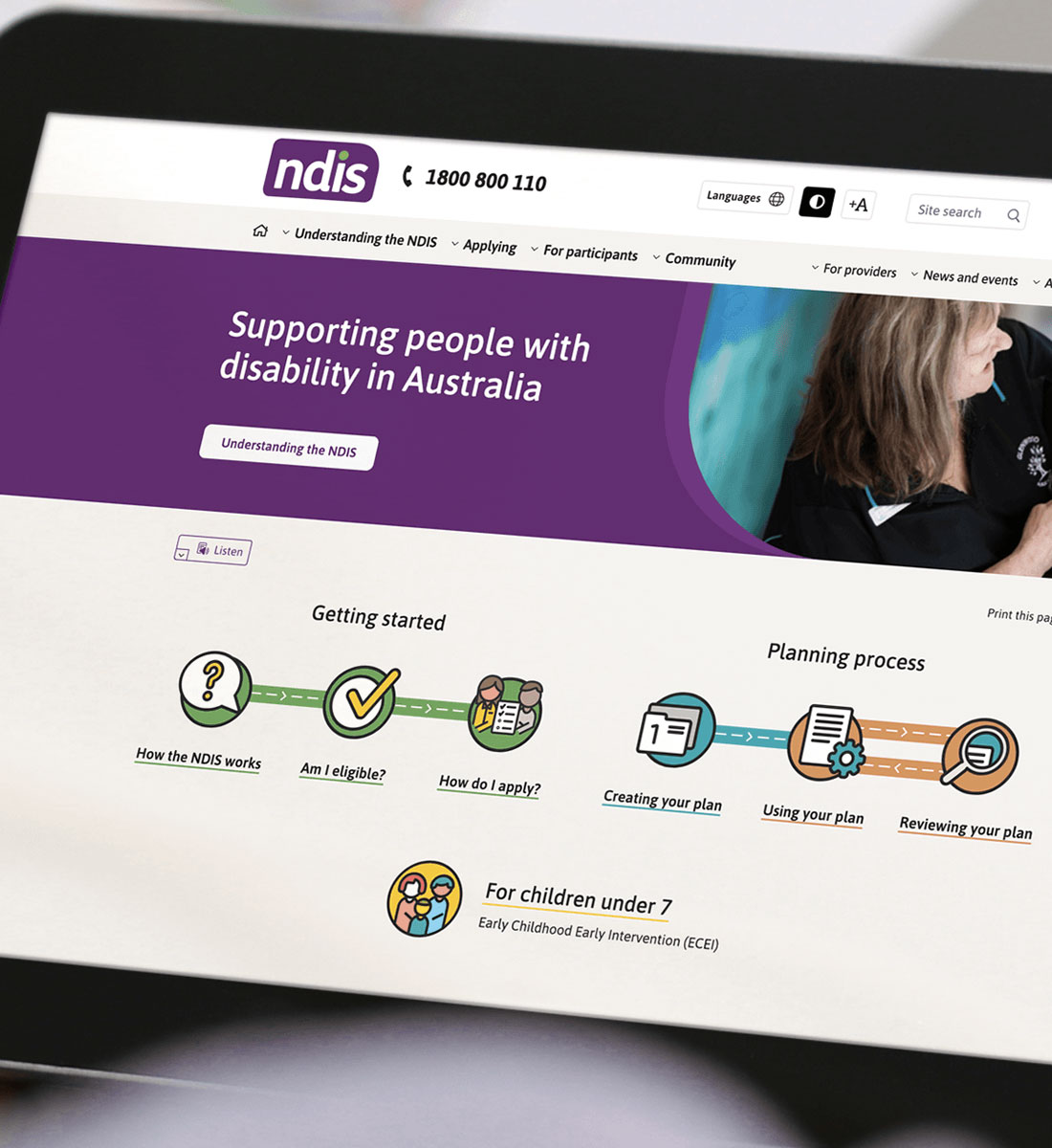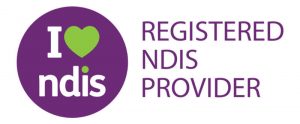
The National Disability Insurance Scheme (NDIS) provides support to people with a disability via support packages that are tailored to individual needs.
The National Disability Insurance Agency (NDIA) has the task of implementing the NDIS. The NDIA commenced work in July 2013 following years of discussion about the need for a major reform of disability services in Australia.
Background to the NDIS
From 2013 to 2016, trial sites at selected locations across Australia were established. In Victoria, this was in the Barwon Area, which includes Geelong and its surrounds.
For people who did not live in the Barwon Area, existing services and disability supports continue until the NDIS is introduced in their area. In Victoria, the roll out of the NDIS will finish in 2019.
More information on Victoria’s roll out can be found at NDIS.
Access to the NDIS is not means-tested and has no impact on any Centrelink financial supports, such as the disability support pension and carers allowance.
The aim of the NDIS
The introduction of the NDIS will reshape the way in which people with disability access the supports they need to achieve their goals and participate fully in community life.
The aim of the NDIS is to support people with a permanent and significant disability that affects their ability to take part in everyday activities.
It does this by identifying what disability supports someone needs in order to help achieve their goals in life. This might include greater independence, involvement in the community, education, employment and health and wellbeing.
The NDIS gives people with disability more choice and control over how, when and where their supports are provided, and gives certainty in receiving the support they need over their lifetime.
The NDIS also focuses on early intervention where getting early supports can reduce the impact of disability on you or your child.
People with a psychosocial disability are also able to access support through the NDIS. A psychosocial disability is one where people significant and permanent functional impairments related to mental health issues.
The aim of the NDIS
The introduction of the NDIS will reshape the way in which people with disability access the supports they need to achieve their goals and participate fully in community life.
The aim of the NDIS is to support people with a permanent and significant disability that affects their ability to take part in everyday activities.
It does this by identifying what disability supports someone needs in order to help achieve their goals in life. This might include greater independence, involvement in the community, education, employment and health and wellbeing.
The NDIS gives people with disability more choice and control over how, when and where their supports are provided, and gives certainty in receiving the support they need over their lifetime.
The NDIS also focuses on early intervention where getting early supports can reduce the impact of disability on you or your child.
People with a psychosocial disability are also able to access support through the NDIS. A psychosocial disability is one where people significant and permanent functional impairments related to mental health issues.
The aim of the NDIS
The introduction of the NDIS will reshape the way in which people with disability access the supports they need to achieve their goals and participate fully in community life.
The aim of the NDIS is to support people with a permanent and significant disability that affects their ability to take part in everyday activities.
It does this by identifying what disability supports someone needs in order to help achieve their goals in life. This might include greater independence, involvement in the community, education, employment and health and wellbeing.
The NDIS gives people with disability more choice and control over how, when and where their supports are provided, and gives certainty in receiving the support they need over their lifetime.
The NDIS also focuses on early intervention where getting early supports can reduce the impact of disability on you or your child.
People with a psychosocial disability are also able to access support through the NDIS. A psychosocial disability is one where people significant and permanent functional impairments related to mental health issues.
Eligibility for the NDIS
In order to access the NDIS, people need to meet the access requirements. These include:
- having a permanent and significant disability that affects your ability to take part in everyday activities
- being under 65 years pf age when you first join the scheme
- being an Australian citizen, a permanent resident or a New Zealand citizen who holds a Protected Special Category Visa
- living in a NDIS area.
Visit the NDIS to find out how to access the scheme.
How your disability supports are determined
To determine what disability supports you might need, the NDIA will work with you and your family to develop a plan of tailored disability supports to help you achieve your goals.
They will ask what you hope to achieve in life and talk to you about the supports that will help you get there. This could include your existing supports if they are meeting your needs and goals. As your needs change over time, the funding plan can be adjusted to change with you.
To be funded, these supports must:
- be related to your disability
- be likely to be effective and beneficial
- not include everyday living costs not related to your disability support needs
- take into account informal supports provided by families, carers, networks or the community
- represent value for money.
The types of supports funded under the NDIS might include personal care, activities, transport, therapies, home and vehicle modification, mobility equipment and help with employment.
For more information on the type of supports and for case studies of people’s experience in NDIS trial sites go the the NDIS
Families and carers and your disability support plan
The NDIA will consider the role of your carer(s) when developing plans with participants.
They will look at the support your carer(s) provide, their other responsibilities and their own life plans. With your consent, this will be done in consultation with your family and carers, recognising the value of their views, knowledge and experience.
Privacy Policy
Purpose and Scope
The purpose of this policy and procedure is to set out staff responsibilities relating to collecting, using, protecting and releasing personal information in compliance with privacy legislation.
Legislation, regulations and standards relevant to this policy and procedure include:
- Privacy Act 1988 (Cwth)
- Freedom of Information Act 1982 (Cwth)
- Freedom of Information Act 1982 (Vic)
- Information Privacy Act 2000 (Vic)
- Privacy and Data Protection Act 2014 (Vic)
- Public Records Act 1973 (Vic)
- Health Records Act 2001 (Vic)
- Disability Act 2006 (Vic)
- Children, Youth and Families Act 2005 (Vic)
- Charter of Human Rights and Responsibilities Act 2006 (Vic)
- Human Services Standards (Vic) – Information Management
- 3.17. Privacy, Data Protection and Protected Disclosures (Terms and Conditions, Service Agreement Information Kit for Funded Organisations, Victorian Department of Health and Human Services)
- Privacy and Personal Information Protection Act 1998 (NSW)
- Health Privacy Principles in the Health Records and Information Privacy Act 2002 (NSW)
- Freedom of Information Act 1989 (NSW)
Documents relevant to this policy and procedure include:
- Australian Community Home Care ’s general Privacy and Confidentiality Policy and Procedure
- Australian Community Home Care Records and Information Management Policy and Procedure
- Australian Community Home Care Continuous Improvement Plan
- Australian Community Home Care Permission Slip
- Australian Community Home Care Declaration of Confidentiality
- Australian Community Home Care Handbook
- Australian Community Home Care Privacy Statement
- Australian Community Home Care Privacy Audit Form
This policy and procedure applies to all:
- Australian Community Home Care staff, contractors and volunteers;
- aspects of Australian Community Home Care ‘s business; and
- staff and client personal and health information.
This policy and procedure should be read in conjunction with Australian Community Home Care ’s Records and Information Management Policy and Procedure. It incorporates the policies and procedures set out in Australian Community Home Care ’s general Privacy and Confidentiality Policy and Procedure.
Definitions
Personal information – Recorded information (including images) or opinion, whether true or not, about a living individual whose identity can reasonably be ascertained.
Sensitive information – Information or an opinion about an individual’s racial or ethnic origin, political opinions, membership of a political party, religious beliefs or affiliations, philosophical beliefs, membership of a professional or trade association, membership of a trade union, sexual preference or practices, or criminal record. This is also considered to be personal information.
Health information – Any information or an opinion about the physical, mental or psychological health or ability (at any time) of an individual.
Policy
- Privacy and confidentiality are of paramount importance to Australian Community Home Care.
- Australian Community Home Care recognises the importance of protecting the personal information of individuals. Clients’ right to privacy and confidentiality is recognised, respected and protected in all aspects of their contact with Australian Community Home Care. All clients have the right to decide who has access to their personal information.
- Australian Community Home Care will collect, use and disclose information in accordance with relevant state and Federal privacy legislation.
- Management (or delegates) are responsible for upholding Australian Community Home Care ’s privacy and confidentiality responsibilities. Australian Community Home Care will operate at all times in accordance with the requirements state and federal legislation.
- Australian Community Home Care will only collect information necessary for safe and effective service delivery. It will only use information collected for the purpose it was collected, and secure it appropriately.
- Information related to clients will not be released to other individuals or services without informed consent from the client or their representative, or in exceptional circumstances.
Procedures
Australian Community Home Care Responsibilities
Management is responsible for:
- Ensuring Australian Community Home Care complies with the requirements of the Privacy Principles as outlined in the Health Records Act 2001, the Information Privacy Act 2000 and, where applicable, the Privacy Act 1988 by developing, reviewing and implementing processes and
practices that identify:
-
- what information Australian Community Home Care collects about individuals, and the source of the information;
- why and how Australian Community Home Care collects, uses and discloses the information;
- who will have access to the information;
- risks in relation to the collection, storage, use, disclosure or disposal of and access to personal and health information collected by Australian Community Home Care.
- Immediately notify the relevant state government agency if they become aware of a breach or possible breach of privacy legislation.
- Ensuring clients or their parents and guardians know why information is being collected and how it will be protected, used, disclosed and disposed of.
- Providing adequate and appropriate secure storage for personal information collected by the service (see Australian Community Home Care ’s Records and Information Management Policy).
- Developing procedures that will protect personal information from unauthorised access.
- Ensuring the appropriate use of images of clients, including being aware of cultural sensitivities and the need for some images to be treated with special care.
- Ensuring all employees and volunteers are provided with a copy of this policy and procedure.
- Ensuring all parents and guardians are provided with the service’s easy-to-read Privacy Statement
and informed that a copy of the complete policy is available on request.
- Ensuring Australian Community Home Care ’s Privacy Statement is prominently displayed at the service and included in Australian Community Home Care ’s Handbook, and that a copy of this policy and procedure is available on request.
- Establishing procedures to be implemented if parents or guardians request that their child’s
image is not to be taken, published or recorded, or when a child requests that their photo not be taken.
- Ensuring Australian Community Home Care ’s arrangements for maintaining privacy and confidentiality are reviewed annually through a privacy audit.
Management (or delegates) are also responsible for:
- Assistance in implementing this policy and procedure.
- Reading and following this Privacy and Confidentiality Policy and Procedure.
- Ensuring management (or delegates) are provided a copy of this policy and procedure and that they complete Australian Community Home Care ’s Declaration of Confidentiality.
- Ensuring all signed Declarations of Confidentiality are retained on the relevant staff record.
- Ensuring all staff maintain up-to-date understanding of their privacy and confidentiality responsibilities through formal induction and ongoing training and team meetings.
- Ensuring improvements identified in this area, including through staff and client feedback, are actioned through Australian Community Home Care ’s Continuous Improvement Plan.
- Monitoring staff knowledge and application of confidentiality and privacy principles on-the-job and through yearly Performance Reviews.
- Providing additional on-the-job and formal training to staff where required.
- Obtaining informed and voluntary consent from clients or their parents or guardians, in order to take photographs or videos.
Australian Community Home Care staff are responsible for:
- Reading and following this Privacy and Confidentiality Policy and Procedure.
- Ensuring they are aware of their responsibilities in relation to the collection, storage, use, disclosure and disposal of personal and health information.
- Collecting, handling, storing, using, disclosing and disposing of clients’ personal and health information in accordance with state and federal legislation and this policy and procedure.
- When collecting personal information from clients or their parent or guardian:
- confirming Australian Community Home Care ’s commitment to maintaining their privacy and confidentiality and the occasions when personal information may need to be released;
- explaining why information is being collected and how it will be used;
- explaining clients’ right to decline providing information;
- explaining clients’ rights in terms of providing, accessing, updating and using personal information, and giving and withdrawing consent;
- advising to whom (or the types of individuals or organisations to which) their information may be disclosed;
- advising the main consequences (if any) for the individual if all or part of the information
is not provided;
-
- obtaining consent from the client or their parent or guardian, using a Consent Form where required;
- collecting information sensitively and within lawful limits; and
- ensuring information is only collected for a specific purpose and limiting the use of the information to the purpose for which it was collected.
Performingtheaboveactivitiesinawaythatissensitiveandcaterstotheculturalanddisability background of the person they are dealingwith.
- Where clients or their supporters have difficulty communicating, using either an interpreter or advocacy service to ensure that consent is informed.
- Keeping all client records up-to-date and stored securely.
- Conducting interviews or sensitive conversations with clients in a private room.
- Respecting clients’ or their parent or guardians’ choices about them being photographed or videoed.
Clients, parents and guardians are responsible for:
- Providing accurate information when requested.
- Maintaining the privacy of any personal or health information provided to them about other individuals, such as contact details.
- Completing all permission forms and returning them to the service in a timely manner.
- Being sensitive and respectful to other clients and guardians who do not want their child to be photographed or videoed.
- Being sensitive and respectful of the privacy of other clients and families in photographs/videos when using and disposing of these photographs/videos.
Client and Family Privacy and Confidentiality
- Australian Community Home Care will only request and retain personal or health information that is necessary to:
- assess a potential client’s eligibility for a service;
- provide a safe and responsive service;
- monitor the services provided; and
- fulfil contractual requirements to provide non identifying data and statistical information to a funding body.
Personal and Health Information Australian Community Home Care Collects
Access
- Client and family information may be accessed by:
- management (or delegates);
- Individuals have the right to:
- request access to personal information Australian Community Home Care holds about them, without providing a reason for requesting access;
- access this information; and
- make corrections if they consider the information is not accurate, complete or up to date.
- There are some exceptions set out in the Information Privacy Act 2000, where access may be denied in part or in total. Examples of some exemptions are where:
- the request is frivolous or vexatious;
- providing access would have an unreasonable impact on the privacy of other individuals;
- providing access would pose a serious threat to the life or health of any person; and
- the service is involved in the detection, investigation or remedying of serious improper conduct and providing access would prejudice that.
- If an individual requests access to or the correction of personal information, within a service benchmark of 2 working days (and no more than 45 days after receiving the request), staff will:
- provide access, or reasons for the denial of access;
- correct the personal information, or provide reasons for the refusal to correct the personal information; or
- provide reasons for the delay in responding to the request for access to or correction of personal information.
Information Storage
Personal files are kept in a secure filing cabinet in a private room, which is kept locked outside of operational hours. Computerised records are stored safely and secured with a password for access.
- Personal files are available for viewing upon request. Client portfolios are available online and can only be accessed by staff and clients/parents with password access.
Information Disclosure
- Client personal and health information will only be disclosed:
- for medical treatment or emergency;
- to outside agencies with the clients’ or parent or guardians’ permission;
- with written consent from person/s with lawful authority; or
- when required by Commonwealth Law, or to fulfil legislative obligations such as mandatory reporting.
- If a staff member is in a situation where they believe that they need to disclose information about a client that they ordinarily would not disclose, they should seek the advice of management before making the disclosure.
Staff Privacy and Confidentiality
Personal and Health Information Australian Community Home Care Collects
Access
This section only applies in the instance where Australian Community Home Care employs staff.
- Staff information may be accessed by Management staff.
- Staff have the right to:
▪request access to personal information Australian Community Home Care holds about them, without providing a reason for requestingaccess;
- access this information; and
- make corrections if they consider the information is not accurate, complete or up to date.
- There are some exceptions set out in the Information Privacy Act 2000, where access may be denied in part or in total. Examples of some exemptions are where:
- the request is frivolous or vexatious;
- providing access would have an unreasonable impact on the privacy of other individuals;
- providing access would pose a serious threat to the life or health of any person; and
- the service is involved in the detection, investigation or remedying of serious improper conduct and providing access would prejudice that.
- If an individual requests access to or the correction of personal information, within a service benchmark of 2 working days (and no more than 45 days after receiving the request), staff will:
- provide access, or reasons for the denial of access;
- correct the personal information, or provide reasons for the refusal to correct the personal information; or
- provide reasons for the delay in responding to the request for access to or correction of personal information.
Information Storage
- Staff records are maintained by management (or delegates) in a locked filing cabinet in their office, which is kept locked outside of operational hours. Computerised records are stored safely and secured with a password for access.
Information Disclosure
- Staff personal and health information will only be disclosed:
- for medical treatment or emergency;
- with written consent from the staff member; or
- when required by Commonwealth Law, or to fulfil legislative obligations such as mandatory reporting.
Photographs and Videos
- Photographs and videos are classified as personal information under privacy legislation.
- On employment a permission slip regarding photos, videos and social media is completed by the employee, to ensure management staff are aware of whether the staff member can be photographed and videoed and how this information can be used.
- The purpose of this permission form is to comply with privacy legislation in relation to all photographs/videos taken at Australian Community Home Care; and
- enable photographs/videos of employees to be taken as part of the programs delivered by Australian Community Home Care, including group photos/videos or
photos/videos at special events and excursions.
Privacy Audits
- Australian Community Home Care will conduct annual privacy audits as per its External Audit and Internal Review Schedule.
- The audit will be based on Australian Community Home Care ’s Privacy Audit Checklist and review:
- what sort of personal information Australian Community Home Care collects, uses, stores and discloses;
- how Australian Community Home Care safeguards and manages personal information, including how it manages privacy queries and complaints; and
- how personal information that needs to be updated, destroyed or erased is managed.
Monitoring and Review
- Australian Community Home Care ’s annual service delivery and satisfaction surveys will include questions regarding:
- satisfaction with Australian Community Home Care ’s privacy and confidentiality processes;
- whether stakeholders have received adequate information about privacy and confidentiality; and
- the extent to which clients and their supporters feel their privacy and confidentiality has been protected.
- Australian Community Home Care ’s Continuous Improvement Plan will be used to record and monitor progress of any improvements identified.
- This Policy and Procedure will be reviewed at least annually by Australian Community Home Care ’s management and incorporate client and other stakeholder feedback.
Endorsement Date:
Last Review Date:
Next Review Date:
This policy and procedure will be reviewed at least 2-yearly and changes endorsed by management.
Where to get help
- Your doctor
- National Disability Insurance Scheme, call 1800 800 110




